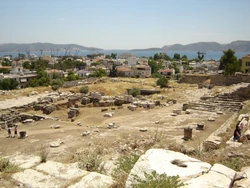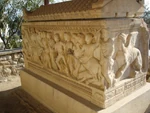
Eleusis (Greek: Ελευσίνα - Elefsina, Ancient Greek: Ἐλευσίς - Eleusis) is a town and municipality in West Attica, Greece. It is situated about 18 km northwest from the centre of Athens. It is located in the Thriasian Plain] at the northernmost end of the Saronic Gulf. It is the seat of administration of West Attica regional unit. It is best known for having been the site of the Eleusinian Mysteries, one of the most famous religious events of the ancient Greek religion,[1] and the birthplace of Aeschylus, one of the three great tragedians of antiquity. Today Eleusis is a major industrial center, with the largest oil refinery in Greece.
Municipality
The municipality Elefsina was formed at the 2011 local government reform by the merger of the following two former municipalities, that became municipal units:[2]
- Elefsina
- Magoula
History
Ancient Eleusis

From as early as 1700 BCE up to the 4th century CE, Eleusis was the site of the Eleusinian Mysteries, or the Mysteries of Demeter and Kore. These Mysteries revolved around a belief that there was a hope for life after death for those who were initiated. Such a belief was cultivated from the introduction ceremony in which the hopeful initiates were shown a number of things including the seed of life in a stalk of grain. The central myth of the Mysteries was Demeter's quest for her lost daughter (Kore the Maiden, or Persephone) who had been abducted by Hades. According to legend, it was here that Demeter, disguised as an old lady who was abducted by pirates in Crete, came to an old well where the four daughters of the local king Keleos and his queen Metaneira (Kallidike, Kleisidike, Demo and Kallithoe) found her and took her to their palace to nurse the son of Keleos and Metaneira, Demophoon. Demeter raised Demophoon, anointing him with nectar and ambrosia, until Metaneira found out and insulted her. Demeter arose insulted, and casting off her disguise, and, in all her glory, instructed Meteneira to build a temple to her. Keleos, informed the next morning by Metaneira, ordered the citizens to build a rich shrine to Demeter, where she sat in her temple until the whole of the world prayed to Zeus to make the world provide food again.
Modern Eleusis
Today, the city has become a suburb of Athens, to which it is linked by the freeway, the Athens metropolitan freeway (Attiki Odos), and Athens metro (transit). A toll post named after the community is on the westbound lanes of GR-8A. North of Eleusis are Mandra and Magoula, while Aspropyrgos is to the northeast. The town lies at the northern apex of the Gulf of Eleusis.
Eleusis is nowadays a major industrial area, and the place where the majority of crude oil in Greece is imported and refined. The largest refinery is located on the west side of town.
Athens' nearest military airport is a few kilometers east of Eleusis. It has been used since the mid-20th century. Its runway is about 2 km and its buildings are to the west.
They are home to the junior football (soccer) team Panelefsiniakos F.C.
Climate
The HNMS weather station of Eleusis has an average maximum July temperature of 33.0°C (1958-2001 HNMS)[3] and has recorded temperatures over 45.0°C nine times between 1973 and 2007. The Eleusis phainomenon is not yet completely understood however factors of geomorphology, warm water masses in the summer and warm winds might be responsible for its summer climate.[3] According to Kassomenos and Katsoulis (2006), based on twelve years of data (1990–2001), the industrialization of west Attica, where at least 40% of the industrial activity of the country is concentrated, could be the cause of the warm climate of the zone.[4]
European temperature record
Eleusis is one of the two Athenian suburbs (the other one is Tatoi) with the highest ever officially recorded temperature in Europe according to the World Meteorological Organization of 48.0°C (118.4°F), on 10 July 1977, by the use of minimum-maximum thermometers. [5]
Historical population

| Year | Population |
|---|---|
| 1981 | 20,320 |
| 1991 | 22,793 |
| 2001 | 25,863 |
Notable people
- Aeschylus (c. 525 BC/524 BCE – c. 456 BC/455 BCE), playwright and veteran of the Battle of Marathon
- Stelios Kazantzidis (1931–2001), singer
- Orestis Laskos (1908–1992), director, screenwriter and actor
- Vangelis Liapis (1914–2008), scholar and folklorist
- Theodoros Pangalos (1938– ), politician
- Ioannis Kalitzakis (1966- ), footballer
References
- ↑ Tripolitis, Antonia. Religions of the Hellenistic-Roman Age. Wm. B. Eerdmans Publishing Company, November 2001. pp. 16–21.
- ↑ Kallikratis law Greece Ministry of Interior (Greek)
- ↑ 3.0 3.1 [1]
- ↑ Kassomenos P.A., Katsoulis B.D. (2006). "Mesoscale and macroscale aspects of the morning Urban Heat Island around Athens, Greece". Meteorology and Atmospheric Phisics, 94, 209-218.
- ↑ Europe: Highest Temperature. Arizona State University World Meteorological Organization
External links
- Official website (English) (Greek)
| This page uses content from the English Wikipedia. The original article was at Eleusis. The list of authors can be seen in the page history. |
